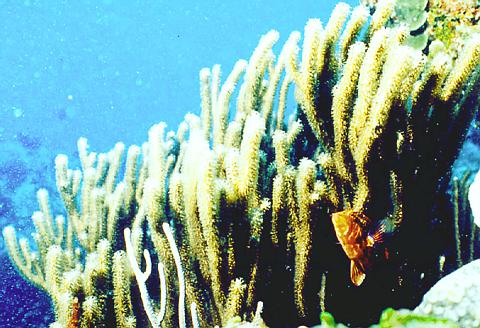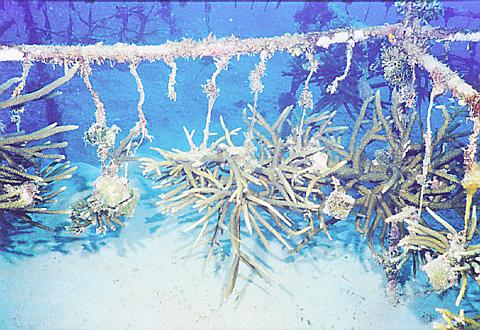Scientists studying coral reefs in Nanwan (
Such bleaching can be caused by disease or adverse changes in the environment around coral colonies, such as increased levels of UV radiation and excessive water temperatures.
At the time, the Third Nuclear Power Plant (

FILE PHOTO
The scientists, Fang Li-hsing (
The bleaching, they said, could be detected as far as 1.5km west of the pipes, and as deep as six meters below the surface, according to data collected by seven monitoring instruments deployed near the pipes.
At the time, coral bleaching was a newly-discovered phenomenon; work on its causes and effects has progressed steadily since.

FILE PHOTO
More than a decade later, Soong Ker-yea (宋克義), a professor of marine biology at the university, is continuing the tough tasks of both monitoring the site's ecological systems and attempting recovery work on the coral.
Current situation
Scientists and officials at the nuclear power facility are cautious when assigning blame to the problem.
"First of all, I should stress that damage to coral reefs in Taiwan's waters can be attributed to both natural and man-made factors," Soong said at a recent press conference held by officials at the nuclear power plant.
He explained that several problems, including over-fishing, water pollution, poaching of both coral and marine animals in addition to the construction of a causeway nearby had acted together to destroy some of the coral.
Composed of the calcified exoskeletons of colonies of marine polyps, coral reefs are among the richest, most productive ecosystems on the planet.
"Coral reefs, which are home to at least 35,000 marine species, exist in only 3 percent of the world's waters," Soong said, adding that Taiwan itself was surrounded by coral reefs.
Soong has begun a coral reef recovery program with assistance from Taipower. It involves work both in the field and in laboratories equipped to observe the properties of growing coral.
Showing reporters photographs taken in waters nearby, Soong said that the program would be able to propose measures to prevent more such environmental catastrophes, and find remedies to halt the deterioration of affected coral reefs.
Soong said that coral bleaching is a growing problem around the globe, and that up to70 percent of existing coral could actually disappear within 40 years, based on data from the US National Oceanic and Atmospheric Administration (NOAA), which has been engaged in global coral reef monitoring work for several years.
"We realize that coral reefs are being destroyed at an alarming rate, but it's hard for us to know precisely where and how much coral bleaching is happening, because of difficulties monitoring conditions underwater," Soong said.
Soong said that several foreign studies have strongly implicated gradual warming of the world's oceans as a major cause of coral reef bleaching.
"Coral is protected from UV light by chlorophyl-containing algae in a symbiotic relationship. But the algae is sensitive to elevated water temperatures, which hinder the process of photosynthesis in the organisms," Soong said.
Less algae means more damaging UV light can reach the coral, resulting in the death of coral colonies.
Hot water from nuclear power plants, he added, has been identified as the main reason for coral bleaching in areas near the Nanwan facility since the phenomenon was brought to light for the first time in Taiwan 11 years ago.
Sharing the blame
Aside from concerns over potential radiation leaks, nuclear power plants are still being targeted by environmentalists for their adverse effects on coral reefs.
In 1987, authorities at the Third Nuclear Power Plant, working together with academics, initiated a comprehensive monitoring and restoration project in coastal areas in southern Taiwan,
"The heat damage to coral reefs and the impact on marine ecology caused by hot water from the plant by itself is limited.
"We have taken action to control variations in the temperature of the water around affected reefs to within 4℃, which is bearable for coral," said Tu Yueh-yuan (杜悅元), director of Taipower's environmental protection department (台電環保處).
"In addition, we are working with the Tungkang Fisheries Research Institute (
"We have been very careful about [coral bleaching]. It's not reasonable to ask for the removal of the power plant just for the sake of the coral," said Tu, adding that the site was chosen for construction of the nuclear plant 15 years ago, before plans were made for Kenting National Park (
Taipower officials added that other factors also blamed for the coral bleaching should be investigated.
Officials said that due to the now-booming sightseeing business in Kenting -- which draws more than 3 million tourists every year -- increased sewage discharge in the area has polluted the waters, causing additional damage to nearby coral.
They added that proper environmental protection should be carried out by collaboration among different governmental administrative units.
A good example, they said, was a recently-completed sewage treatment network in the Nanwan area.
Construction of the sewerage system cost NT$610 million and has been in operation since last January. It can treat 3,000 tonnes of sewage daily, they said.
"Everyone should play their part in protecting our treasured environment," said Chen Pu-tsan (

NATIONAL SECURITY THREAT: An official said that Guan Guan’s comments had gone beyond the threshold of free speech, as she advocated for the destruction of the ROC China-born media influencer Guan Guan’s (關關) residency permit has been revoked for repeatedly posting pro-China content that threatens national security, the National Immigration Agency said yesterday. Guan Guan has said many controversial things in her videos posted to Douyin (抖音), including “the red flag will soon be painted all over Taiwan” and “Taiwan is an inseparable part of China,” while expressing hope for expedited “reunification.” The agency received multiple reports alleging that Guan Guan had advocated for armed reunification last year. After investigating, the agency last month issued a notice requiring her to appear and account for her actions. Guan Guan appeared as required,

A strong cold air mass is expected to arrive tonight, bringing a change in weather and a drop in temperature, the Central Weather Administration (CWA) said. The coldest time would be early on Thursday morning, with temperatures in some areas dipping as low as 8°C, it said. Daytime highs yesterday were 22°C to 24°C in northern and eastern Taiwan, and about 25°C to 28°C in the central and southern regions, it said. However, nighttime lows would dip to about 15°C to 16°C in central and northern Taiwan as well as the northeast, and 17°C to 19°C elsewhere, it said. Tropical Storm Nokaen, currently

PAPERS, PLEASE: The gang exploited the high value of the passports, selling them at inflated prices to Chinese buyers, who would treat them as ‘invisibility cloaks’ The Yilan District Court has handed four members of a syndicate prison terms ranging from one year and two months to two years and two months for their involvement in a scheme to purchase Taiwanese passports and resell them abroad at a massive markup. A Chinese human smuggling syndicate purchased Taiwanese passports through local criminal networks, exploiting the passports’ visa-free travel privileges to turn a profit of more than 20 times the original price, the court said. Such criminal organizations enable people to impersonate Taiwanese when entering and exiting Taiwan and other countries, undermining social order and the credibility of the nation’s

‘SALAMI-SLICING’: Beijing’s ‘gray zone’ tactics around the Pratas Islands have been slowly intensifying, with the PLA testing Taiwan’s responses and limits, an expert said The Ministry of National Defense yesterday condemned an intrusion by a Chinese drone into the airspace of the Pratas Islands (Dongsha Islands, 東沙群島) as a serious disruption of regional peace. The ministry said it detected the Chinese surveillance and reconnaissance drone entering the southwestern parts of Taiwan’s air defense identification zone early yesterday, and it approached the Pratas Islands at 5:41am. The ministry said it immediately notified the garrison stationed in the area to enhance aerial surveillance and alert levels, and the drone was detected in the islands’ territorial airspace at 5:44am, maintaining an altitude outside the effective range of air-defense weaponry. Following